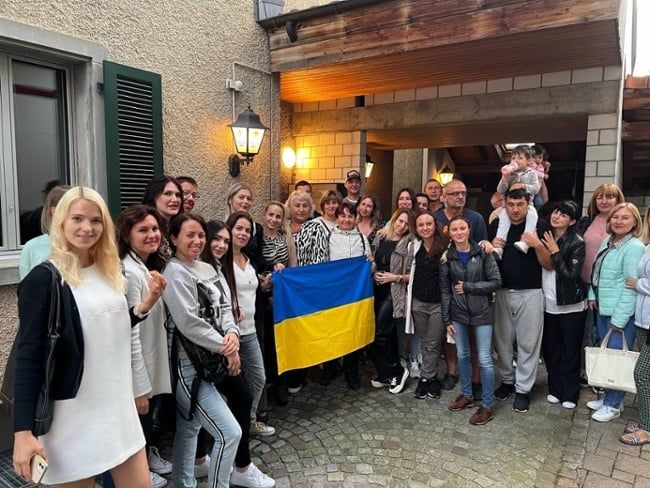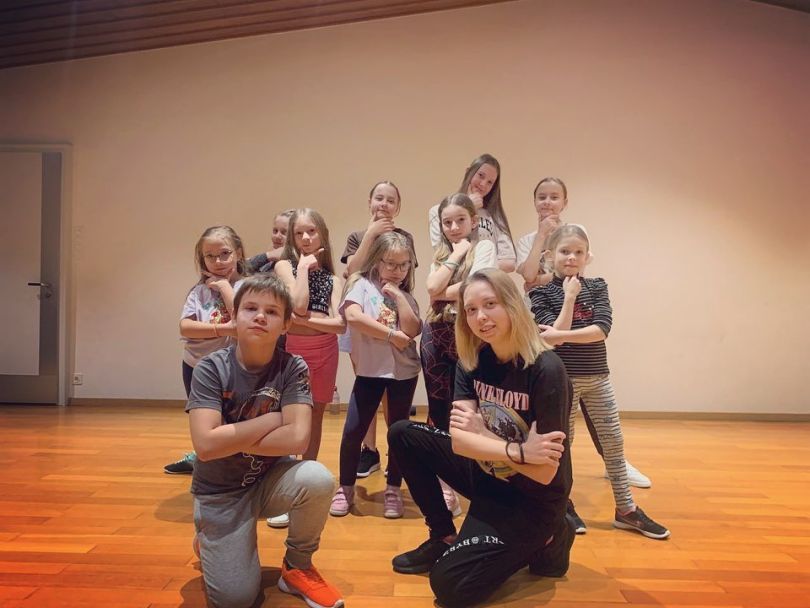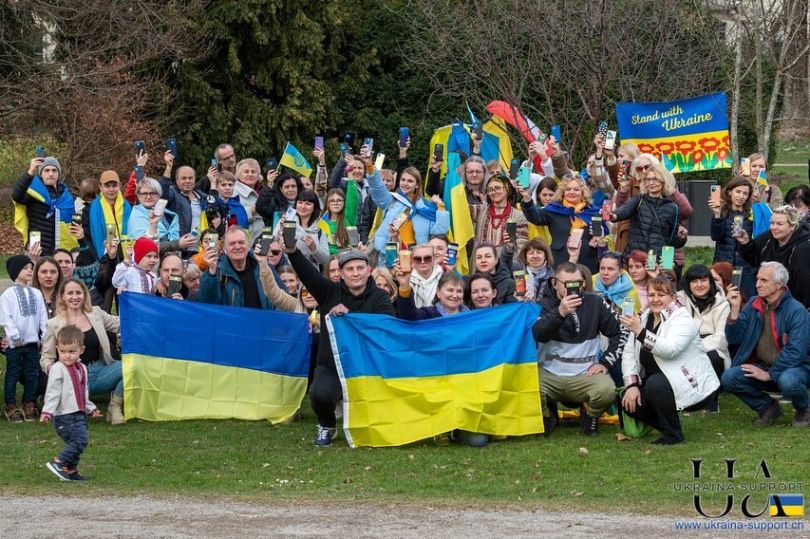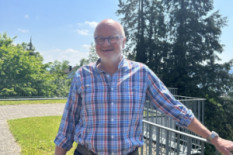How did your initiative come about? Where did it all start?
Nicole: Our initiative arose from the need for safe housing for people who arrived from Ukraine during the early days of the full-scale war, which deeply affected many Swiss citizens. I immediately contacted my Ukrainian friend, who has been living in Switzerland for some time, and informed her that my house was open to anyone needing shelter. The next day, she called and told me three Ukrainians required accommodation. However, when they arrived, it turned out there were six of them. It was more than I expected. Nevertheless, I managed to find an empty house to accommodate them.
That's how it all started, and over time, more and more people approached me with similar requests. To this day, I have helped around 60 Ukrainians find housing through me or "Ukraine Support".
Swiss legislation requires that all people arriving in the country be placed in refugee centers, but the official assistance provided is minimal. My experience shows that it is slow and insufficient due to the many refugees. The state provides some funding, but more information should be available regarding health insurance, access to medical care, enrollment in schools, etc. We have long waiting lists for German language courses. This leads to people feeling hopeless, depressed and facing difficulties in rapid integration.
In October last year, we decided to work through the association to ensure stronger, better, and more informed support in Winterthur and the surrounding areas. We developed a strategy to identify the real needs of people who have just arrived in the country. One of its main focuses is German language courses.
What other areas of work do you cover?
Another direction of our work is providing opportunities for hobbies and expressing emotions through physical activity. Therefore, we offer various dance groups. Additionally, we noticed a lack of support for children and are currently developing German language and painting courses for them and sports clubs, focusing on developing children's talents.
We understand that not all Ukrainians will return to Ukraine, and children are the future of Switzerland, so we must take care of them. We have two goals. The first is to better support adults by helping them navigate their experiences, increase their self-confidence through professional coaching, and develop their talents and skills. We strive to integrate them into the Swiss job market successfully.
The second goal is to focus on the talents and competencies of children and ensure they are not overlooked.
Currently, we are also interested in the development of small businesses in Switzerland and are open to Ukrainians who are interested in starting their ventures. However, this can be challenging without investors and a deep understanding of Swiss laws and regulations. We have a pilot project for one business and are working on the necessary steps to make it a reality.
Snizhana: Every Friday, we hold regular meetings to discuss topics such as career guidance, housing search, resume creation, using LinkedIn for job search, and other issues that Ukrainian people may be unfamiliar with. After the meeting, we have German language courses, conversation clubs, and time for socializing and interacting, which is also an essential aspect of integration.
What motivates you to continue your activities?
Snizhana: I wasn't involved in volunteering before, but I felt that now I have to help because when I came to Switzerland, I was supported by many people. So I started going to different places to offer assistance, and one time, I met Nicole, who invited me to a picnic with Ukrainians. It was an excellent opportunity to get to know and communicate with Swiss people, learn more about them, and integrate into society. Later, Nicole invited me to her house for dinner, where we discussed creating a volunteer chat. We didn't know exactly what it would be called or how it would work, but we wanted to bring people closer together so that they could have the opportunity to communicate and exchange ideas. That was supposed to happen. I came for the second time, and we started meeting every Friday.
At some point, someone suggested forming an association because we were already meeting regularly, and some people were interested in volunteering. We did it, and I thought that when I had time, I could help because I wanted to do it.
Nicole: The development of our initiative has been a natural and organic process. We came together because we wanted to exchange ideas and have meaningful conversations. I applied the Scrum methodology to the development process to better understand the concepts and visions of the people involved in the project. This approach is connected to my professional experience, as I have previously worked in several startups and large corporations.
So, do you know how to start?
Nicole: My professional activity is related to marketing and brand development, and now I work 100% for Ukraїna Support and 100% for my earning - essentially 200%. I firmly believe that now is not the time to say "no"; the crisis has engulfed Europe, and democratic values are threatened. This significant political shift will impact Europe and the world for a long time. I must do everything possible to unite and fight against it. I happily dedicate my time to this cause and don't feel like I'm working too much because I have a clear purpose.
Is it a sense of mission?
Nicole: Yes, it is a sense of mission. I have noticed many Swiss citizens who are helping feel the same way. They want to support us for the long term, understand the importance of the situation, and believe that we need to stick together. Our work is focused on helping people and ensuring their safety. We have a diverse team, including Hannes, who is very compassionate towards the people we serve. He understands their difficulties, strives to provide safe housing, and establishes deep connections with them.
On the other hand, Snizhana also understands people from Ukraine and is eager to provide them with the necessary support. It is vital to allow them to overcome the crisis they are facing in Switzerland and find employment that will help them support their fellow countrymen in Ukraine. It's a collective effort; we all have different motivations and goals.
We have a strong board with excellent members, which is a huge advantage. This strength is a guarantee of our ability to effectively communicate with Ukraine and provide support to those who need it.
Snizhana: In Switzerland, it can be challenging to find Swiss people open to refugees, especially in the German-speaking part and in Geneva. However, people like Nicole, Hannes, and Renata Simel have made a decisive contribution to supporting Ukrainians. Many of them are very grateful for the incredible help they have received from the Swiss in Winterthur. Seeing how many of our fellow citizens are willing to support Ukrainians motivates me to do even more.

I believe the most important aspect to understand is that this is no longer just Ukrainian history. It has become a collective history that touches everyone.
As Nicole said, we are in a period of human development where fundamental changes occur. We need to decide which side we are on. We cannot remain on the sidelines because the situation in Ukraine is just one of the reasons for the transformations that need to happen. It is a sad reason, but it is also an opportunity to awaken people's attention to what is happening in the world and their concerns.
How has your life changed since you started volunteering extensively? Balancing work, family, and supporting the Ukrainian organization is quite challenging. Have you found a balance, and how do other Swiss people react to it? Is it easier or more challenging for you to involve them in supporting your cause?
Nicole: Currently, it is undoubtedly more challenging to engage people than it was a year ago. Sensitivity towards the war has decreased, and many people are tired of hearing about it. I don't talk much about my volunteer work with colleagues, but I have found a few people who are interested and willing to listen. However, thanks to our growing popularity and our work, we are attracting more and more Swiss people to our meetings who are interested in helping.
Regarding my personal experiences, I initially went through a deep shock, and it was challenging to manage my emotions. I felt a strong urge to help but also genuine despair. I opened up my fears and old wounds that needed to be addressed. But in the end, this experience helped me develop much more empathy and understand myself and why I'm doing this. Interestingly, I thought it was about choosing myself, but it turned out to be self-discovery, a journey to myself. This experience made me stronger and more confident. I became more determined to make a positive impact and refused to back down from this commitment.
However, there were challenges in my personal life as well. My relationship suffered due to my involvement in volunteering. I invest a lot of time, which is then ultimately missing for my family. I'm working on finding a balance here. Despite these challenges, I remain true to my mission and believe it is worth the sacrifices.
You mentioned several exciting topics, including the development of children's talents. In Ukraine, many affordable sports clubs and art schools offered a wide range of activities. However, here in Switzerland, children face a language barrier and are unfamiliar with the structure of many things, complicating their participation in such programs. Some parts of Switzerland already have practical solutions to specific problems. I am very interested in your approach to developing children's talents.
Please tell me more about it.
Nicole: We have two approaches to developing children's talents. The first one is to find out what exactly children need. We have created a survey asking parents what sports their children would like to participate in. Based on the responses, we can assess sports clubs in Winterthur and ask them if they would accept Ukrainian children free of charge. Of course, there is a language barrier. Still, placing two or three Ukrainian children in one sports club will facilitate their integration and help overcome the language barrier. This requires specific organizational skills, but I believe that this way we can find a solution for many children.
The second approach is to provide talented children who have experience in sports in Ukraine with the opportunity to develop further. For them, we would like to organize fundraising to provide them with something more than just experience in a sports club. We plan to raise 2000 francs for each talented child.
As for drawing, we can invite a teacher from Ukraine who can implement their professional skills and experience. But even in this case, I would also like to invite Swiss children to these classes. The same goes for dance clubs, where Swiss children will also participate.

I'm also interested in learning about the small business project since I have read in various Ukrainian forums that many people seek solutions. The entrepreneurial spirit in Ukraine is quite strong, and many Ukrainians had businesses before. It was much easier to start a business in Ukraine than in Switzerland, and I'm curious about how you will make this project successful.
Nicole: Yes, it's a complex question and requires knowledge of Swiss laws and business funding sources. In Switzerland, starting a business on your own is considered a sole proprietorship, which entails higher risk than working under a contract, especially if your business is not performing well.
Indeed, in Ukraine, it is possible to start over; it's not a problem. In Switzerland, it is associated with significant risk if the business fails. Therefore, a problem arises.
Nicole: If you have an employment contract, you and the company contribute a small amount from your monthly salary to insurance. Unemployment insurance (AHA article) pays 70% of your salary if you lose your job until you find a new one. But if you start your own business, you bear all the risks yourself, and the insurance company will not pay you anything if your business is unsuccessful. As a self-employed person (sole proprietorship), you do not pay unemployment contributions for yourself. For this reason, you are not entitled to compensation from unemployment insurance in the event of unemployment, unless you have previously paid contributions from employment within the framework period. So in case of failure you then need to go back to social office - and start from the very beginning. That's why it's difficult for me to explain to Ukrainians that creating a small business can a) quickly exceed the money they get from the social office so they need to pay (inclusive all insurances, tax) all by themselves with a too small amount of turnover and b) self-employed persons are not insured against unemployment which is a risky way to start doing business in Switzerland.
It is essential to convey all these norms to Ukrainians so that they know the risks of their own business. In my Swiss mentality, this is considered risky because I am accustomed to a certain level of job security. And I would like Ukrainians to be protected and integrated into the safe Swiss way of life. My approach is acting through an association and providing protection since it is a legal entity, not a physical person.
So, can an association help with the business?
Nicole: There are differences between an association and a limited liability company. Both of the forms need a good understanding of Swiss law and the registration process. Whatever you choose as the right vessel: You need to know how you should build up the organization. For both you need to have knowledge about regulations when it comes to salary, insurance for the employees, work permit, tax declaration, proper accounting. You need to know the target group, market volume, needed capital to start, etc. This is something I strongly suggest for Ukrainians as well: Get to know the market first, develop the value proposition, start with a test, find starting capital. Then found a company. The big difference between a limited liability company and an association is that an association is not allowed to work profit-oriented. The founding capital for a limited liability company amounts to CHF 20,000. This can be contributed in cash or in goods (car, furniture, equipment). Whereas an association can be founded without start-up capital. But an association is also regulated. It must comply with certain mandatory guidelines and is normally not the first choice when someone wants to start a successful business.
It would be great to allow people from different regions to share ideas and successes in small businesses. The idea is to establish association branches in other cantons so that they can provide legal support to each other and stay together rather than being isolated.
Snizhana: Support for Ukrainians can be expanded to other cities. We can help with that. Being a member of an association is common for Swiss people, but Ukrainians don't always understand what it means and how to do it. Many things are characteristic of Switzerland. For example, Ukrainians should learn how to write formal letters. We have to send a lot of emails here. It's also part of Swiss culture. And advice on correctly doing it will be helpful for Ukrainians living here.

What do you think is most important for Ukrainians today?
I believe that my fellow citizens would like to be more independent and efficient. Relying on social benefits for a long time is unacceptable for many of us, as self-sufficiency is a priority. On what important things should we focus?
Nicole: I think Ukrainians need to make more effort to find employment. I want to help them find the strength to leave their homes, meet people, and communicate. It can be challenging for those who suffer from depression, but they must be noticed. The next step is to look for opportunities in Switzerland. During our meetings, we should remind them of this and share the best examples of the successful integration of Ukrainians. Integration always involves good interaction with other cultures. As long as Ukrainians remain within their community, interaction will be limited. It is essential to portray Ukrainians positively, including in the media, as there has also been negative coverage.
I completely agree. The more we showcase good examples, the better. It will help others believe that success is possible. And besides, when the Swiss see that we are not just asking for help but also taking action, it significantly improves communication.
Nicole: Yes, and one piece of advice - if you want to integrate, join a Swiss organization like a choir or a sports club. There, you can meet Swiss people and get to know them better. Initially, it may be challenging as you might not understand everything, but the Swiss, in general, are open and willing to help.
And what are your plans within the association? What challenges and thoughts do you have for the future?
Snizhana: In the future, we plan to pay more attention to children because we understand that they will face challenges related to the German language and integration. And this is especially important for them. Adults have more opportunities, and it can be more difficult for children. This is the first thing we plan to address.
Ukraїna Support address:
Löwenstrasse 4, 8400 Winterthur
Phone: +41 76 710 44 20
Ukraine Support Links:
Website
Telegram chat
Instagram
Facebook
LinkedIn







